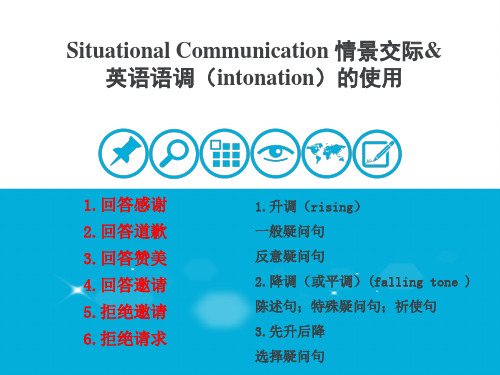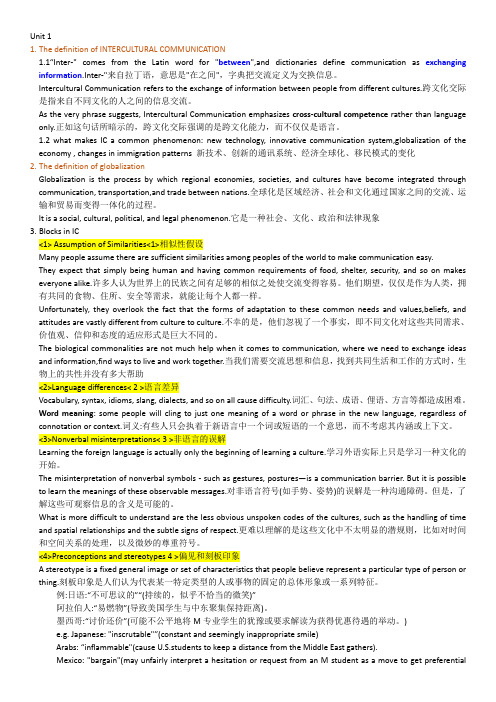中考复习——situational communication
中考英语沟通技巧的提升与人际关系改善策略单选题40题

中考英语沟通技巧的提升与人际关系改善策略单选题40题1. —Could you pass me the book?A. Sure.B. Yes, I could.C. Certainly.D. Of course I can.答案:C。
本题考查礼貌用语的使用。
选项A“Sure.”比较随意;选项B“Yes, I could.”语法上不太符合习惯表达;选项C“Certainly.”较为正式和礼貌;选项D“Of course I can.”语气稍显强硬。
2. —Would you mind helping me?A. No, not at all.B. No, I don't.C. No problem.D. Never mind.答案:A。
选项A“No, not at all.”非常礼貌地表示不介意;选项B“No, I don't.”回答不太恰当;选项C“No problem.”比较随意;选项D“Never mind.”通常用于回应别人的道歉。
3. —Excuse me, may I ask you a question?A. Yes, you may.B. Yes, please.C. Certainly.D. Of course.答案:B。
选项A“Yes, you may.”比较生硬;选项B“Yes, please.”很礼貌地回应请求;选项C“Certainly.”和选项D“Of course.”语气相对比较直接。
4. —Thank you very much.A. You're welcome.B. That's all right.C. Don't mention it.D. It's my pleasure.答案:D。
四个选项都是对感谢的回应,选项D“It's my pleasure.”最为礼貌和正式,表示这是我的荣幸。
选项A“You're welcome.”比较常用;选项B“That's all right.”也可以;选项C“Don't mention it.”相对随意一些。
9,当代西方人际传播理论述评——以八种视角为参考框架

当代西方人际传播理论述评——以八种视角为参考框架西方关于人际传播理论的研究发端较早,迄今积累下来的理论成果非常丰富,这就为后人的总结和整理提供了基础。
1978年,密歇根大学的杰拉德·米勒(Gerald R. Miller)在名为《人际传播理论与研究的现状》的论文中,将以往的传播学理论研究的视角或者方法分为四种类型。
1第一种类型是情境的方法(The Situational Approach),认为人们在区别各种人际传播形式的时候主要是通过描绘不同的场合、情境和环境来实现的;第二种类型是发展的方法(The Developmental Approach),认为人类的交往和传播处在一种线形的发展态势当中。
发展的观点后来被“过程”的观点所取代,这是因为人们的关系并不都是处在一种良性的“发展”态势当中,一段关系也有可能是倒退的,而“过程”这个概念则有很大的灵活性和延伸性,可以描述前进和倒退的关系类型;第三种类型是规律的方法(The Law-Governed Approach),认为人际交往和传播中存在着一些基本的规律,这些规律决定着人们的交往和传播;最后一种类型是规则的方法(The Rule-Governed Approach),认为支配人际关系和传播的是一些具体的规则,在通常条件下,人们都是通过遵守这些规则来行事,但也有可能打破规则,只不过打破规则人要受到某种惩罚,这一点和规律不同,规律是不可打破的,当规律出现例外时,规律的合法性就要受到质疑了。
米勒的分类为当时人们探讨人际传播理论提供了一个基本的参考框架。
1999年,格伦·斯坦普(Glen H. Stamp)在内容分析的基础上,提出了更为细化的分类标准。
他通过研究1975—1999年发表在《人类传播研究》上的288篇关于人际传播研究的文章,用草根理论的方法将这些研究文章的研究路径归为17个大类。
2分别是:(1)认识(32篇,11.1%)。
武汉中考英语专题-情景交际对话

第二节课:情景交际(二)
打Hale Waihona Puke 话: Is that ...speaking ?(不用Are you...? 或Who are you?)
告别:Farewells
I am afraid I must go now/ I must be going now
I think it's time for me to leave.
see you (later/again/tomorrow).
Making thanks and responses
Thanks a lot Thank you very much Thanks for your help It's very kind/nice of you Thank you anyway Thank all the same (依旧感谢)
It's a pleasure(乐意效劳) ; That's all right(不必谢)
(代我向你的父母问好)
Nice/Glad to see you again.
Introduction 介绍:注意升降调
May I call you Robert?(升调)
You can call me Eric.
Are you Mike?
Nice to meet you /Glad to meet you This is Alice What is your name? Which school are you from?(降调) Who is your favorite star?
You're welcome .不客气; Don't mention it!
英语情景交际题练习题

英语情景交际题练习题### English Situational Communication Practice Questions1. Situation: You are at a restaurant with a friend, and you realize that the waiter has forgotten to bring your drinks.Question: What would you say to the waiter to politely remind him about the drinks?Answer: "Excuse me, I hope you don't mind me mentioning this, but we were supposed to receive our drinks a while ago. Could you please check on them for us?"2. Situation: You are on the phone with a customer service representative, and you are not satisfied with the product you received.Question: How would you express your dissatisfaction and request a refund?Answer: "Hello, I'd like to discuss the product I recently purchased. I'm not satisfied with its performance, and I believe it's not as described. I would like to request a refund according to your company's policy."3. Situation: You are at a party, and someone is telling a joke that you find offensive.Question: How would you politely express your discomfort without ruining the atmosphere?Answer: "I appreciate the humor, but I must say that joke didn't quite sit well with me. I hope you understand that everyone has different sensitivities."4. Situation: You are in a meeting, and you have a great idea that you want to share, but you're not sure if it's the right time.Question: How would you bring up your idea without interrupting the current discussion?Answer: "May I add a thought to the discussion? I believe it could be relevant to our current topic, and I'd love to hear everyone's thoughts on it."5. Situation: You are at a store, and you need help finding a specific item.Question: What would you say to an employee to ask for assistance?Answer: "Hello, I'm looking for a particular item but I'm having trouble finding it. Could you possibly assist me or direct me to someone who can?"6. Situation: You are at an event, and you've been introduced to someone whose name you've forgotten.Question: How would you ask them to remind you of their name without being rude?Answer: "I apologize, but I've had a bit of a memory lapse. Could you please remind me of your name? I'd hate to forgetit again."7. Situation: You are in a taxi, and you realize that the driver is taking a longer route than necessary.Question: What would you say to address the issue without sounding confrontational?Answer: "I've noticed we're taking a longer route than I expected. Would you mind taking the more direct way? I'm in a bit of a hurry."8. Situation: You are at a networking event, and you want to make a good impression on a potential employer.Question: How would you introduce yourself and expressyour interest in their company?Answer: "Hello, my name is [Your Name], and I'm very interested in the work your company does. I'd love to discuss potential opportunities and how my skills might align withyour team's needs."9. Situation: You are in a bookstore, and you're looking fora book that's out of stock.Question: How would you inquire about when the book might be available again?Answer: "Excuse me, I'm interested in this book, but it seems to be out of stock. Could you tell me when you expect to have more copies available?"10. Situation: You are at a conference, and you want to ask a speaker a question during the Q&A session.Question: How would you frame your question to be concise and engaging?Answer: "Thank you for your insightful presentation. I have a question regarding [specific topic]. Could you elaborate on [specific aspect]?"These practice questions are designed to help you navigate various social and professional situations with confidence and politeness. Remember, effective communication is key to building positive relationships and resolving conflicts.。
应用文写作:关于学习英语 高考英语二轮复习

3) Diverse: The content and forms are rich and diverse, such as English literature, oral English, writing, culture, etc. 多样性:内容形式丰富多样,如英语文学、口语、写作、文 化等。
2) Appreciation and analysis of English movies: Watch English movies, learn the language and culture therein, and conduct analysis and discussion. 英语电影欣赏与分析:观看英语电影,学习其中的语言文化, 并进行分析讨论。
The students now pay more attention to communicating and cultural skills in the language rather than focus on test-oriented learning.
Yours,
Li Hua
校本课程的开设情况 校本课程的开设情况主要包括以下方面:
3)Learning to sing English songs: Learn classic English songs to improve the sense of language and pronunciation. 英语歌曲学唱:学习经典英语歌曲,提高语感和发音。
4)Appreciation of English literature: Study English literary works to enhance literary literacy and reading comprehension ability. 英语文学鉴赏:研读英语文学作品,提升文学素养和阅读理 解能力。
组织—公众关系视角下的情境危机传播理论研究

组织—公众关系视角下的情境危机传播理论研究世界进入风险社会,高风险带来危机常态化。
情境危机传播理论(Situational Crisis Communication Theory,以下简称SCCT理论)是西方主流的危机传播理论,对其的借鉴和发展能够指导中国危机传播实践。
目前的情境危机传播研究主要关注危机情境、回应策略,以及情境与回应策略之间的匹配性。
研究者虽然提到组织-公众关系状态会影响到危机情境,并对组织的危机回应策略产生影响,但并没有对这些观点进行实证的检验。
因此,本研究则填补了这方面的空白。
本研究的研究问题主要包括:第一,组织-公众关系(OPRs)是否会影响公众对危机责任的感知;组织-公众关系(OPRs)是否会影响公众对组织声誉的评价;第二,公众对危机责任的感知是否会影响到其对组织声誉的评价;公众的对组织声誉的评价是否会影响到其对组织的行为倾向:第三,组织所采纳的危机回应策略是否会降低公众的危机责任感知;能否提高公众对组织的声誉评价;第四,哪些危机回应策略对降低危机责任感知、提高组织声誉评价和提高公众行为倾向的效果最好。
本研究使用使用3×4的受试者组间因子实验的方法,通过实验设计及操控情境因素及实验变量。
本研究首先从三种危机群集中选择出一种——意外危机群集作为研究类型;其次,选择三种组织-公众关系状态,分别是:正面组织-公众关系史、中立组织-公众关系史、负面组织-公众关系史;最后,选择四种危机回应策略,分别是:替罪羊、借口、补偿、不回应。
研究的自变量为关系状态与回应策略,因变量为危机责任感知、声誉评价与行为倾向。
研究表明,第一,组织-公众的关系状态能够影响到公众对组织的危机责任感知,正面组织-公众关系状态下,公众对组织的责任感知最低;中立关系状态下,公众对组织的危机责任感知次之;负面关系状态下,公众对组织的责任感知最高;第二,组织-公众关系状态影响到公众对组织的声誉评价,正面关系和中立关系状态下,公众对组织的声誉评价高于负面关系状态;第三,公众的危机责任感知与公众对组织的声誉评价负相关,公众对组织的声誉评价与公众对组织的声誉评价正相关;第四,组织的危机回应策略确实能够影响到公众的责任感知、声誉评价及行为倾向;且与危机情境相匹配的回应策略能够对组织的声誉起到保护作用。
新编跨文化交际英语教程 复习总结

Unit 11.The definition of INTERCULTURAL COMMUNICATION1.1“Inter-" comes from the Latin word for "between",and dictionaries define communication as exchanging information.Inter-"来自拉丁语,意思是"在之间",字典把交流定义为交换信息。
Intercultural Communication refers to the exchange of information between people from different cultures.跨文化交际是指来自不同文化的人之间的信息交流。
As the very phrase suggests, Intercultural Communication emphasizes cross-cultural competence rather than language only.正如这句话所暗示的,跨文化交际强调的是跨文化能力,而不仅仅是语言。
1.2 what makes IC a common phenomenon: new technology, innovative communication system,globalization of the economy , changes in immigration patterns 新技术、创新的通讯系统、经济全球化、移民模式的变化2.The definition of globalizationGlobalization is the process by which regional economies, societies, and cultures have become integrated through communication, transportation,and trade between nations.全球化是区域经济、社会和文化通过国家之间的交流、运输和贸易而变得一体化的过程。
中考话题复习人际交往(教师版)

中考话题复习——人际交往(教师版)●话题解读《英语课程标准》中关于“人际交往”的子话题有:1.社会行为;2.合作与交流。
主要从以下角度进行考查:1.如何与他人沟通或相处;2.如何客观、冷静地应对问题;3.成长的烦恼及应对烦恼的做法及建议;4.对人际沟通中存在的问题给出建议;5.如何成为一名文明的学生、美德少年或优秀的青少年。
●复习重点及教材链接1.发出、接受、拒绝邀请:八年级上册Unit 9 Can you come to my party?八年级上册Unit 10 If you go to the party, you’ll have a great time.2.请求许可和询问信息:八年级下册Unit 3 Could you please clean your room?九年级Unit 3 Could you please tell me where the restrooms are?●基础夯实词汇通关1.收到某人的来信receive a letter from sb./ hear from sb.2.拒绝做某事refuse to do3.劝告某人做某事advise sb. to do4.同意做某事agree to do sth.5.赞同某人agree with sb.6.一条建议a piece of advice7.提出建议give advice8.听从某人的建议follow one’s advice9.对某人/物持好的态度have a good attitude towards sb. /sth.10.和某人争吵argue with sb.11.为……找理由excuse for sth./ for doing sth.12.邀请某人做某事invite sb. to do sth.13.邀请某人到某地invite sb. to sp.14.建议做某事suggest doing sth.15.和朋友交流chat with friends16.要求某人(不)做某事ask sb. (not) to do sth.句型通关1. 她和她妹妹关系亲密。
- 1、下载文档前请自行甄别文档内容的完整性,平台不提供额外的编辑、内容补充、找答案等附加服务。
- 2、"仅部分预览"的文档,不可在线预览部分如存在完整性等问题,可反馈申请退款(可完整预览的文档不适用该条件!)。
- 3、如文档侵犯您的权益,请联系客服反馈,我们会尽快为您处理(人工客服工作时间:9:00-18:30)。
河南中考链接
76. (Sorry,) I’m not sure (2014· 河南) (Sorry,) I don’t know A: It's a nice day. I’m sorry, but I have no idea B: Yes, it's a beautiful day . A: Are there so many people here all the time? B: 76.______________________. This is my first time here. A: Me, too. I think this is a great place. 77.IWhere are you (visiting) from B: Yeah, think so too. Where do you come from A: 77.______________________________________________? 78. I’m (visiting) from… B: I’m visiting from London. How about you? I come from…. A: 78._____________________________________________. B: That’s cool. long Are you having goodhere time? 79. How have you a been A: Yes. There many to see and I’m taking a lot of picture. How are long will things you stay here 80. That’s great/cool/wonderful B: 79._____________________________________________? How long are you stayingIt here seems that you’re having a good A: For two weeks, I went to San Francisco and Los Angeles. I want to see time I leave. Yellow Stone National Park before You must have had a good time B: 80.___________________________________________________. you A: Oh, my friends are waiting for me.Have I hope yougood enjoy /pleasant/…trip(there) your stay here. I hope you can have a B: Thank you. It was nice meeting you. good/pleasant/…trip(there
3.看病: 1 A: What’s wrong with you? What’s the matter? What’s up? B: I have a headache. 2 A:Your face looks pale, what’s wrong with you? B: (1)I have got a headache/cough. (2)I'm not feeling well./I don't feel very well./I feel terrible. (3)There's something wrong with...
6.购
物
1
A: Can I help you?/What can I do for you ? B: I want/would like to buy some beef. A: How many kilos/much do you want ? B:I would like/want two kilos. A: What about this coat? B: It’s pretty good. Can/May I try it on ? A: Of course.
考 点 揭 秘
河 南 中 考
题 型 分 解
模 拟 训 练
Situational communication
2016中考英语复习
•提出话题 •展开话题 •结束话题
提出话题
1.问候式: 1 A: Nice to meet you, Miss Green. B: ____________________________. 2 A:_____________________ ? B:It’s pretty well./ Not bad./ Not very well/ It’s terrible. 2.问天气: 1 2 A: _____________________________? B: It’ sunny here. How about yours there? A:What will be the weather tomorrow ? B:__________________? we can’t go for the picnic.
A: 1 ____________________? B: They are talking about yesterday's football match. A: Oh, I watched it on TV. Beijing Team had very good teamwork. Didn't you watch it? B: 2 ____________.I did my homework and forgot the time. When I turned on the TV, it had finished already. A: 3 _____________! But Beijing Team will play again this evening. B: 4. ______________________________? A: Sure. You'd better finish your homework earlier if you want to watch it. Remember.5. ___________________. B: That's a good idea. (Looking at his watch.) Oh, I haven't much time left. I'd better hurry to finish my homework.
1.旅游 (travelling) 2.问路 (Asking the way) 3.购物 (Shopping) 4.看病 (Seeing the doctor) 5.就餐 (Taking meals ) 6.谈论天气 (Talking about the weather) 7.制定计划 (making plans)
考 点 揭 秘
河 南 中 考
题 型 分 解
模 拟 训 练
河南中考链接
76.Who(m) did you go there with your holiday in the country last week? Who(m) did you enjoy your holiday with 提出话题 A: Morning, Tina. Did you enjoy B: Yes, I really had a lot of fun With there. whom did you go there
J: Hi, Lin Tao! I called you yesterday morning, but you were not in. 1.____________________________________? L: Oh, I went to see my grandparents with my father and mother. J: Don't your grandparents live with you? L: No. 2. _______________. It's not far from here. J: A village? Is it beautiful? L: Yeah, it's very beautiful. There's a river around it. Trees and flowers are everywhere. And my grandparents have a big farm. J: Great! What's on the farm? L: Orange trees. Grandpa wants me to go back to pick oranges this autumn. Well, 3. _____________? J: I'd love to. And we can eat oranges while picking them, can't we? L: Of course. Oh, 4. ________________________? J: Er, I called you to go hiking with me. But it doesn't matter. I asked Mike and Sam instead. L: 5. _________________________? J: Yes, we enjoyed ourselves very much.
2
3
Situational communication
2016中考英语复习
•提出话题 •展开话题 •结束话题
A: Excuse me, 1. ______________________? I haven't seen him for weeks. B: Jim's gone to England. A: Really? 2. _____________________? B: He went there last week. A: 3. __________________________? B: Yes. He had lived there for 15 years before he came to China. A: 4. ___________________________? B: He traveled with his friends. A: 5. ___________________________? B: He'll be away for about two weeks. A: Oh, thank you. I'll phone him this evening.
